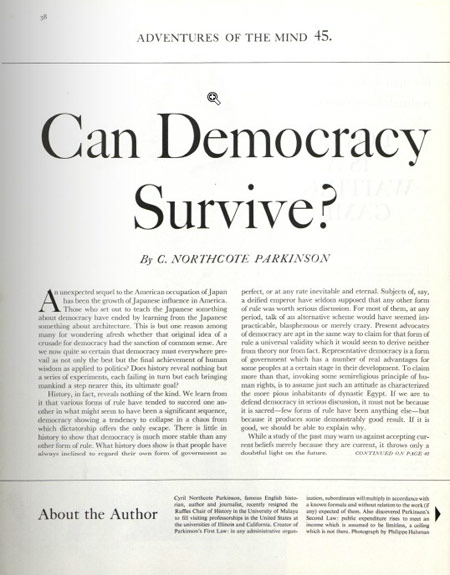Can Democracy Survive?
Every election puts a strain on the republic, but this past election was exceptional. Weeks before voting began, Americans were questioning whether the election was rigged and if some voters would cast illegal ballots. There was even talk of refusing to accept the official results.
It’s now clear that America remains divided over the election. It has sparked protests in several cities, and many people are declaring the election winner is “not my president.”
Belief in the election process was once the foundation for Americans’ faith in democracy. We were taught to trust that the combined wisdom of voters would find the best candidates. So if Americans lose faith with the way their officials are chosen, is democracy doomed to fail?
Back in 1960, when the hard campaign between Kennedy and Nixon was underway, C. Northcote Parkinson asked, “Can Democracy Survive?” for the Post.
He didn’t offer any easy reassurances. Parkinson even questioned the assumption that democracy was government evolved to its highest level. Democracies, he said, showed “a tendency to collapse in a chaos from which dictatorship offers the only escape.”
American democracy, Parkinson wrote, had one advantage that would ensure its survival: a large middle class. Typically, democracies die from the warfare that springs up between the wealthy and poor classes. The middle class of America, which was still growing in 1960, would prevent the country from being polarized between the rich and impoverished.
James Madison was more optimistic than Parkinson. In a 1787 essay for The Federalist Papers, he said American democracy would prevail because it was a republic, not a direct democracy. The people might be swayed by demagogues and shifting opinions, but the representatives they elected would be less susceptible to mob enthusiasms.
There is a third factor to consider: participation. The greatest threat to democracy isn’t a handful of fanatics or even a political party. It’s voter participation — and the official voter turnout in the 2016 election was just 55%.
Robert M. Hutchins, dean of Yale Law School from 1927 to 1929, observed, “The death of democracy is not likely to be an assassination from ambush. It will be a slow extinction from apathy, indifference, and undernourishment.”

Featured image: Shutterstock